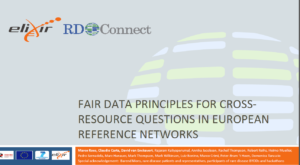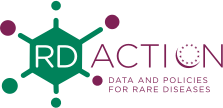What is FAIR Data?
FAIR data principles encourage robust management of data and metadata (i.e. data about data) for efficient use and reuse by humans and computers. In brief, FAIR principles prescribe that data is:
| Findable | = (meta)data is uniquely and persistently identifiable and should have basic machine readable descriptive metadata. |
| Accessible | = data is reachable and accessible by humans and machines using standard formats and protocols, noting that ‘accessible’ does not equal ‘open’ |
| Interoperable | = (meta)data is machine readable and annotated with resolvable vocabularies/ontologies. |
| Reusable | = (meta)data is sufficiently well-described to allow (semi)automated integration with other compatible data sources. |
Key Publications: Wilkinson, M. D. et al. The FAIR Guiding Principles for scientific data management and stewardship. Sci. Data 3:160018 doi: 10.1038/sdata.2016.18 (2016) https://www.ncbi.nlm.nih.gov/pubmed/26978244
For more information on the FAIR data concept see https://www.dtls.nl/fair-data/
Why should rare disease data generators/users get involved?
- Organisations which now endorse FAIR data principles include ELIXIR, BBMRI, the European Open Science Cloud, FORCE11, NIH (through its ‘commons’ program) and the G20
- In Summer 2017, the FAIR team submitted an application to have FAIR principles endorsed as an IRDiRC Recognized Resource – http://www.irdirc.org/activities/irdirc-recognized-resources/
- The FAIR principles were highlighted at the RD-ACTION Workshop Co-hosted with DG SANTE – Making FAIR Data in the ERN framework (Roos and Carta) RD-ACTION Workshop 27.4.17
How might ERNs and Rare Disease Stakeholders engage with FAIR data experts?
The m ost logical point of engagement is the new GO-FAIR implementation network currently being established in the rare disease domain, the main goal of which is to professionalize FAIR services for rare diseases and ERNs
ost logical point of engagement is the new GO-FAIR implementation network currently being established in the rare disease domain, the main goal of which is to professionalize FAIR services for rare diseases and ERNs
For more information see https://www.dtls.nl/fair-data/go-fair/
A general GO-FAIR office is incorporated in the Netherlands; contact: Mascha Jansen (mascha.jansen@dtls.nl);
Questions about FAIR and the GO-FAIR implementation network for the rare disease domain can be sent to fair-rd-info@elixir-europe.org.
